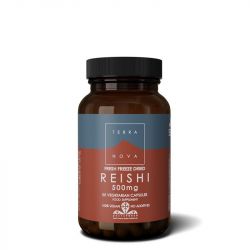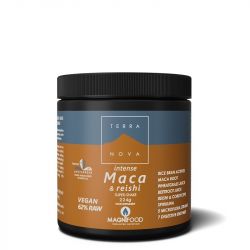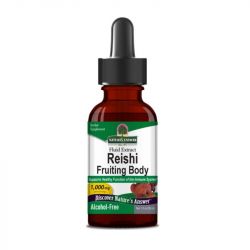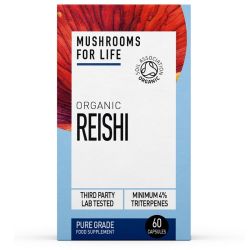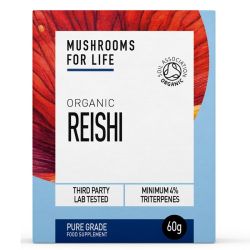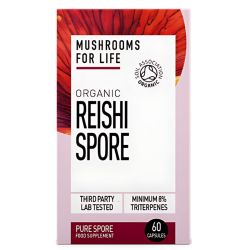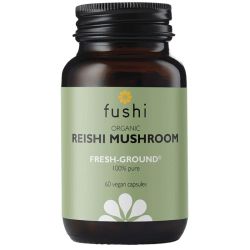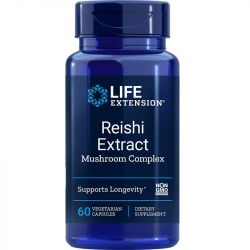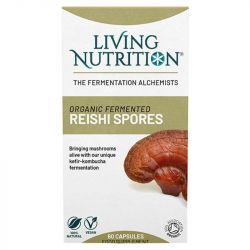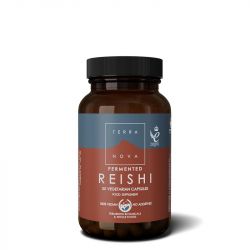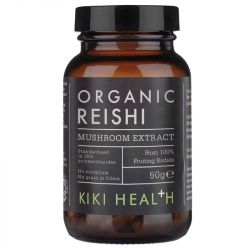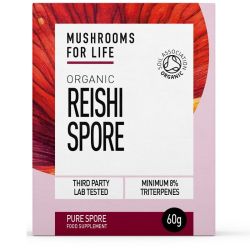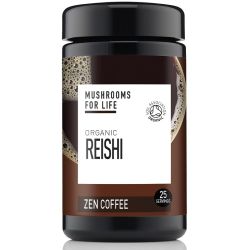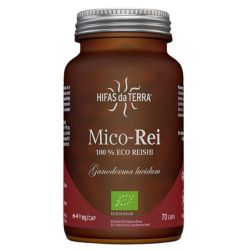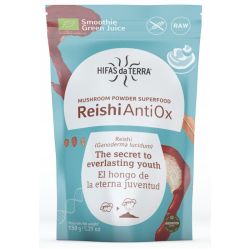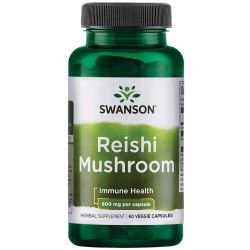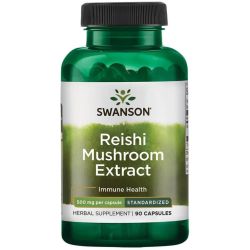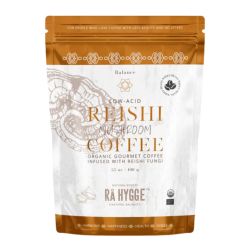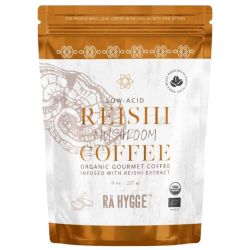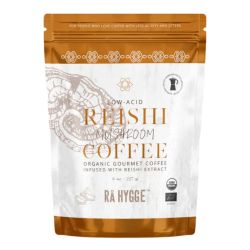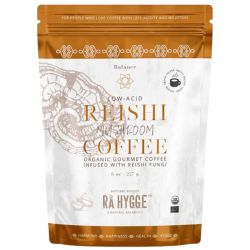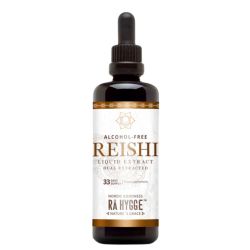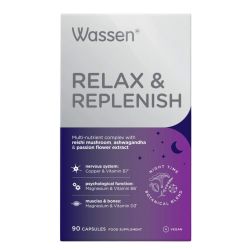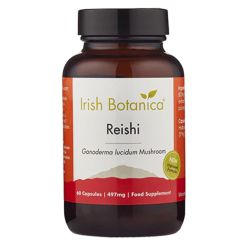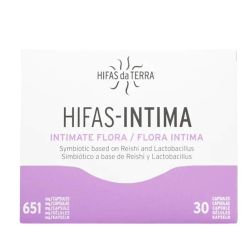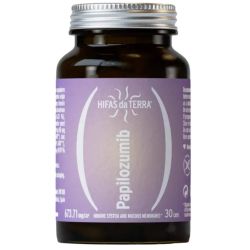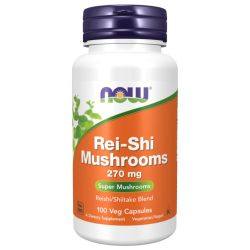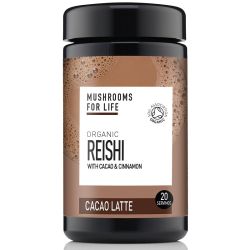Reishi Mushroom Supplements
Reishi Mushrooms are one of the most famous mushroom species. Known as the "Mushroom of immortality", they are commonly taken in supplement form as powders, capsules or coffees.
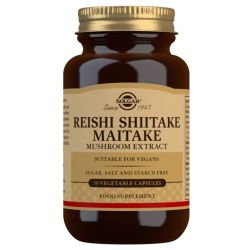 Solgar Reishi Shiitake Maitake Mushroom Extract Vegicaps 50Special Price £25.46 Regular Price £33.95
Solgar Reishi Shiitake Maitake Mushroom Extract Vegicaps 50Special Price £25.46 Regular Price £33.95- Mushrooms for Life Organic Reishi Cacao Latte 140gSpecial Price £19.99 Regular Price £24.99Out of stock
All you need to know about Reishi
What are Reishi Mushrooms?
Reishi mushrooms, scientifically known as Ganoderma lucidum, are a type of medicinal mushroom highly valued in traditional Chinese medicine and other traditional healing systems for their potential health-promoting properties. Reishi mushrooms have a long history of use dating back thousands of years, and they are often referred to as the "mushroom of immortality" or the "king of mushrooms" due to their purported health benefits.
What do Reishi Mushrooms do?
Some of the key bioactive compounds found in Reishi mushrooms include:
-
Polysaccharides: Reishi mushrooms are rich in polysaccharides, including beta-glucans and heteropolysaccharides. These complex carbohydrates have been shown to modulate the immune system, stimulate the production of immune cells, and enhance immune function. Beta-glucans, in particular, are known for their immunomodulatory effects.
-
Triterpenes: Reishi mushrooms contain triterpenes, which are a class of compounds known for their pharmacological properties. The main triterpenes found in Reishi mushrooms are ganoderic acids, ganoderiol, and ganodermanontriol. These triterpenes have been studied for their potential anticancer, anti-inflammatory, antioxidant, and hepatoprotective effects.
-
Peptides: Reishi mushrooms contain various peptides, which are short chains of amino acids with bioactive properties. Some peptides found in Reishi mushrooms have been shown to exhibit antioxidant, antimicrobial, and immunomodulatory activities.
-
Sterols: Reishi mushrooms contain sterols, which are natural compounds with diverse biological activities. Sterols found in Reishi mushrooms, such as ergosterol and ergosterol peroxide, have been studied for their potential antitumor, anti-inflammatory, and cholesterol-lowering effects.
-
Polysaccharide-Protein Complexes: Reishi mushrooms contain polysaccharide-protein complexes, which are believed to contribute to their therapeutic properties. These complexes, such as the beta-glucan-protein complex, have been shown to enhance immune function and exert antitumor effects.
-
Adenosine: Reishi mushrooms contain adenosine, a nucleoside that plays a role in various physiological processes. Adenosine has been studied for its potential cardiovascular benefits, including vasodilation, antiplatelet aggregation, and antiarrhythmic effects.
-
Organic Germanium: Reishi mushrooms are one of the richest natural sources of organic germanium, a trace element with antioxidant properties. Organic germanium has been studied for its potential immune-enhancing, antiviral, and anticancer effects.
What are the benefits of taking Reishi Mushrooms?
There are a range of potential benefits to be had by using Reishi Mushrooms:
- Immune Support: Reishi mushrooms are known for their immunomodulatory effects, helping to enhance the body's natural defense mechanisms and promote immune function.
- Anti-Inflammatory Effects: Reishi mushrooms contain compounds that have been shown to possess anti-inflammatory properties, potentially reducing inflammation and related health conditions.
- Antioxidant Protection: Reishi mushrooms are rich in antioxidants, which help neutralize harmful free radicals and protect cells from oxidative damage.
- Stress Reduction: Reishi mushrooms are often used to help combat stress, promote relaxation, and support mental well-being.
- Liver Health: Some research suggests that Reishi mushrooms may have hepatoprotective effects, supporting liver function and detoxification processes.
How much Reishi Mushrooms should I take per day?
The optimal dosage of Reishi mushrooms can vary depending on several factors, including the individual's health status, the specific health condition being targeted, the form in which Reishi mushrooms are consumed (e.g., fresh, dried, supplement), and the concentration of bioactive compounds in the product.
There is no standard recommended dosage for Reishi mushrooms, as research on their efficacy and safety is ongoing, and individual responses may vary. However, here are some general guidelines to consider:
-
Dosage Recommendations:
- For Reishi mushroom supplements, manufacturers typically provide dosage recommendations on the product label. Follow the recommended dosage instructions provided by the manufacturer unless otherwise directed by a healthcare professional.
- Dosages of Reishi mushroom supplements can vary widely, ranging from a few hundred milligrams to several grams per day, depending on the product's concentration and intended use.
-
Start Low and Gradually Increase:
- If you're new to taking Reishi mushroom supplements, it's generally recommended to start with a lower dosage and gradually increase it over time as needed.
- Pay attention to your body's response and adjust the dosage accordingly. Some individuals may experience gastrointestinal discomfort or other side effects at higher doses.
-
Consult with a Healthcare Professional:
- A healthcare provider can provide personalised guidance based on your individual health status, medical history, and any potential interactions with medications or existing health conditions.
-
Consideration of Product Form:
- The form of Reishi mushrooms you're using may also influence the dosage. For example, concentrated extracts or tinctures may require lower dosages compared to raw or dried mushrooms.
- Follow the dosage recommendations provided on the product label for the specific form of Reishi mushrooms you're using.
-
Consistency and Duration:
- Consistency is key when taking Reishi mushrooms for potential health benefits. Incorporate them into your daily routine and take them consistently over an extended period to maximize potential benefits.
- While some individuals may experience noticeable effects relatively quickly, it may take several weeks or months of consistent use to fully experience the benefits of Reishi mushrooms.
How long does Reishi Mushrooms take to work?
The time it takes for Reishi mushrooms to produce noticeable effects can vary depending on several factors, including the individual's health status, the specific health condition being targeted, the dosage used, and the form in which Reishi mushrooms are consumed (e.g., fresh, dried, supplement).
-
Type of Benefits:
- Immune Support: Some people may experience a boost in immune function relatively quickly after incorporating Reishi mushrooms into their diet or supplementation routine. This could manifest as fewer instances of illness or faster recovery times from infections.
- Stress Reduction: Reishi mushrooms are often used to help combat stress and promote relaxation. Effects on stress levels and mental well-being may be noticeable within a relatively short period, depending on individual response.
- Anti-Inflammatory Effects: Reishi mushrooms contain compounds with anti-inflammatory properties, which may help reduce inflammation and related symptoms over time with consistent use.
-
Consistency and Dosage:
- Consistently consuming Reishi mushrooms over an extended period may lead to more pronounced and sustained effects compared to sporadic use. Higher dosages or more concentrated forms of Reishi mushroom supplements may also yield faster results.
-
Individual Variability:
- Individual responses to Reishi mushrooms can vary based on factors such as metabolism, genetics, overall health, and the presence of underlying health conditions. Some people may notice improvements sooner than others, while for some, it may take longer to observe any noticeable effects.
-
Form of Consumption:
- Reishi mushrooms can be consumed in various forms, including supplements, teas, extracts, or dried mushrooms. The form in which they are consumed may influence how quickly their beneficial compounds are absorbed and utilized by the body.
When is the best time to take Reishi Mushrooms?
The best time to take Reishi mushrooms can depend on various factors, including the intended purpose for use and personal preferences. Here are some considerations to help determine the optimal timing:
-
For General Health Maintenance:
- Reishi mushrooms can be consumed at any time of the day as part of a balanced diet to support overall health and well-being. Many people choose to incorporate them into meals or snacks throughout the day.
-
For Immune Support:
- Reishi mushrooms are often taken to support immune function. In this case, consuming them in the morning or earlier in the day may be beneficial as it allows the body to take advantage of their immune-boosting properties throughout the day.
-
For Stress Reduction and Relaxation:
- Reishi mushrooms are also valued for their calming and stress-reducing effects. Consuming them in the evening or before bedtime may promote relaxation and improve sleep quality for some individuals.
-
For Chronic Health Conditions:
- If you're using Reishi mushrooms to manage chronic health conditions such as inflammation, autoimmune disorders, or cardiovascular issues, consider taking them consistently at the same time each day to maintain steady blood levels of their bioactive compounds.
-
With Meals or on an Empty Stomach:
- Reishi mushrooms can be taken with meals or on an empty stomach, depending on personal preference. Some people prefer to take them with food to aid digestion, while others may find it more convenient to take them separately.
-
Consistency is Key:
- Regardless of the specific timing, consistency is essential for maximizing the potential benefits of Reishi mushrooms. Aim to include them regularly in your diet or supplementation routine to support long-term health outcomes.
What are the side effects of taking Reishi Mushrooms?
Reishi mushrooms are generally considered safe for most people, and they are well tolerated when consumed as a food or supplement.
That said if you experience any kind of common allergic reaction (e.g. Itchy Skin, Rashes) then you should immediately stop using them.
Can I take Reishi Mushrooms everyday?
How do I grow Reishi Mushrooms at home?
Here's a basic overview of how to grow Reishi mushrooms at home using the log cultivation method:
Materials Needed:
- Reishi Mushroom Spawn: Purchase Reishi mushroom spawn (also known as "plug spawn" or "inoculated dowels") from a reputable supplier. Spawn is usually made of wooden dowels inoculated with Reishi mushroom mycelium.
- Hardwood Logs: Select fresh, healthy hardwood logs from trees such as oak, maple, or beech. Logs should be approximately 3-6 feet long and 4-8 inches in diameter.
- Drill with Drill Bit: Use a drill with a drill bit size that matches the diameter of the spawn dowels.
- Wax or Beeswax: Prepare a sealing wax or beeswax to seal the spawn holes and prevent contamination.
- Mallet or Hammer: Use a mallet or hammer to tap the spawn dowels into the drilled holes.
- Storage Area: Choose a shaded, humid area outdoors for incubating the inoculated logs.
Steps to Grow Reishi Mushrooms:
-
Prepare the Logs:
- Select fresh hardwood logs and cut them to the desired length (3-6 feet).
- Drill holes into the logs at regular intervals (4-6 inches apart) and to a depth of about 1 inch.
- The number of holes will depend on the size of the logs and the amount of spawn available.
-
Inoculate the Logs:
- Insert Reishi mushroom spawn dowels into the drilled holes. Tap the dowels gently into place using a mallet or hammer.
- Ensure that the spawn dowels are firmly seated in the holes to prevent them from falling out.
-
Seal the Holes:
- Seal each spawn hole with melted wax or beeswax to protect the spawn from contaminants and to maintain moisture levels.
- Apply the wax generously to cover the entire surface of each hole.
-
Incubate the Logs:
- Place the inoculated logs in a shaded, humid area outdoors, such as under a tree or in a covered porch.
- Reishi mushrooms require a cool, moist environment for colonization. Keep the logs moist by watering them regularly or covering them with a damp cloth.
-
Monitor Growth:
- Reishi mushroom mycelium will colonize the logs over the next several months to a year, depending on environmental conditions and the quality of the spawn.
- Monitor the logs for signs of colonization, such as white mycelial growth around the spawn holes.
-
Harvest Reishi Mushrooms:
- Reishi mushrooms will begin to fruit from the colonized logs when environmental conditions are favorable. This typically occurs after 6 months to 1 year.
- Harvest the mature Reishi mushrooms by cutting them from the surface of the logs using a sharp knife or scissors.
Additional Tips:
- Environmental Conditions: Reishi mushrooms prefer cool, shady environments with high humidity. Monitor moisture levels and provide adequate shade to prevent the logs from drying out.
- Patience is Key: Growing Reishi mushrooms using the log cultivation method requires patience, as it can take several months to a year for the mushrooms to fruit. Be patient and maintain consistent environmental conditions for best results.

